Is AI still “just a trend” or is it a necessity for your business?
Let’s go back to the last time you were put on hold, listening to music that’s interrupted every 30 seconds to tell you how important your call is. Finally, an agent answers—only to transfer you to someone else.
On the other end, customer service agents’ phone lines are tied up by repetitive questions and simple tasks. When a 1-800 number is the fastest support option you provide, time and costs quickly add up.
Some of the biggest challenges for businesses today include balancing speed, efficiency, and quality in customer support while keeping costs under control. AI customer service helps your business expand your service capacity without hiring more people.
So, let’s check out how you can easily and effectively adopt this technology to improve your support.
Level up your customer service using AI
What is AI in customer service?
AI customer service refers to the use of tools powered by artificial intelligence to automate support and improve its efficiency. The software provides AI-powered customer service agents that can respond to customer inquiries, welcome new users, assist with checkout, answer FAQs, and more.
These systems use natural language processing (NLP) and machine learning to understand questions, give relevant responses, and improve themselves over time.
Businesses that receive a high volume of calls, emails, chats, messages, and more benefit from AI-driven support. Even small businesses that can’t afford to hire more service staff but want to provide great support across channels can leverage AI agents.
So—how do you actually use AI in customer service?
Let’s find out.
How to use AI in customer service
To make the most of AI in customer service, you should deploy AI agents, implement omnichannel customer service, automate workflows, and enable self-service options, amongst others.
Here are the details, steps, and real life examples of AI in customer service:
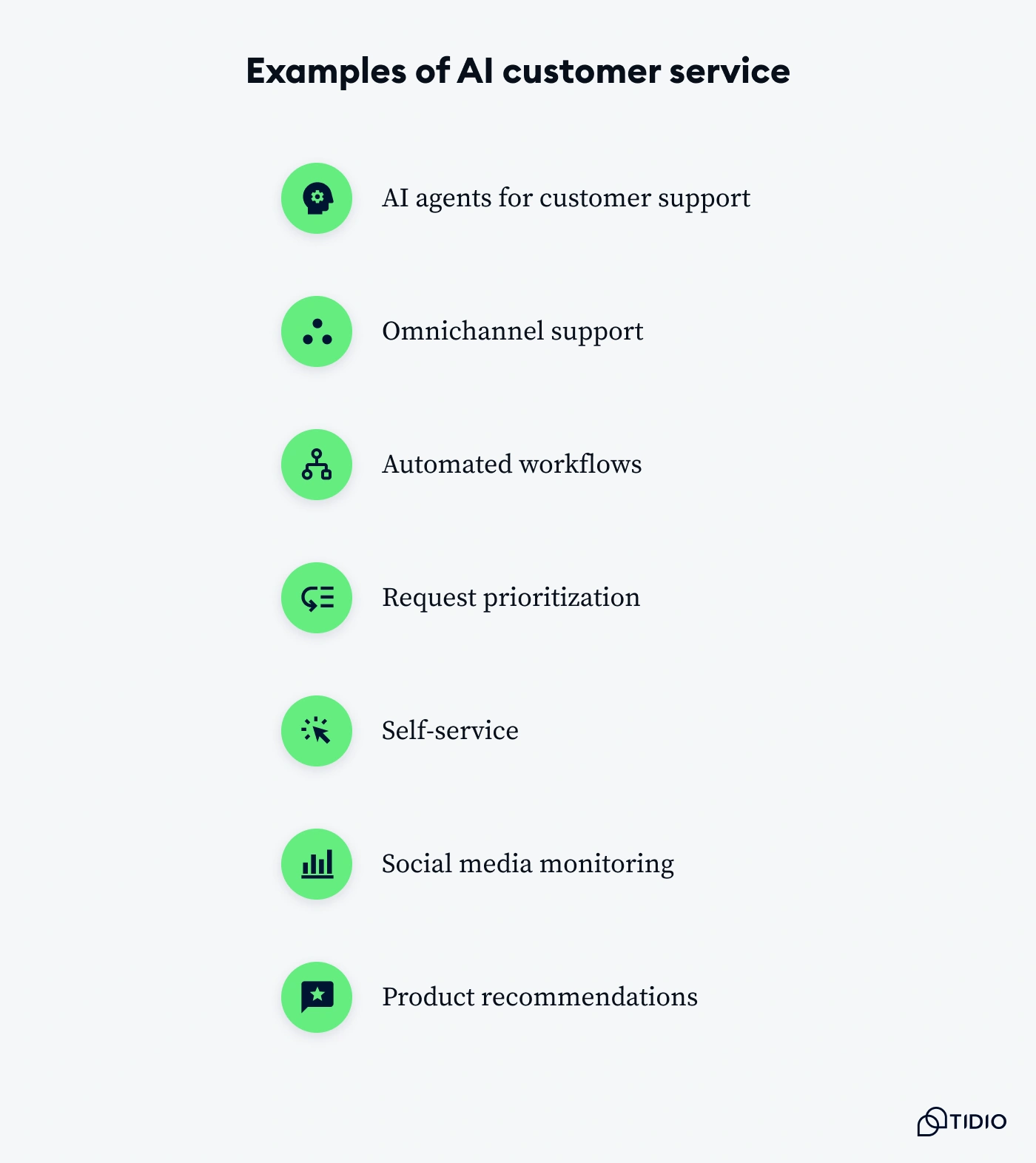
1. Use AI Agents as frontline support
AI agents are powerful tools that use machine learning, predictive analytics, and natural language processing to provide exceptional customer service.
How do agents work so well?
Essentially, they’re designed to quickly recognize common speech patterns and chat triggers in order to provide relevant information based on their knowledge sets. You can design conversation flows for your bots, use ready-made templates, or choose LLM-powered (Large Language Model) agents, like Lyro, that learn from each user interaction they have.
And what can you use them for?
Well—possibilities are countless. You can use AI agents to answer FAQs, reply to emails, respond to DMs, provide multilingual support, and much more.
As an example, Gecko Hospitality used Tidio’s AI Agent, Lyro, to boost their support. The hospitality management recruitment company achieved a 90% automation rate in customer service, drastically reducing response times and improving efficiency.

Gecko Hospitality streamlined resume collection and automated segmentation to ensure recruiters received the right resumes instantly. In just six months, the AI system helped to generate 257 new leads, optimizing recruitment and client engagement. Additionally, Lyro provided 24/7 support, handling common inquiries and ensuring accurate responses.
2. Implement omnichannel customer service
Omnichannel support is an approach that provides a seamless experience across multiple channels, allowing customers to switch between platforms without losing context. It covers live chat, email, phone support, social media, messaging apps (WhatsApp, Messenger, SMS), self-service portals, chatbots, and more. Omnichannel service ensures the company provides a consistent customer experience across different channels, devices, and platforms.
In fact, studies show that companies offering omnichannel support can achieve a 90% higher customer retention rate than those providing service on a single channel.
How does AI fit here?
Actually, it fits perfectly. Seamless AI customer service tools, such as Tidio, offer synchronous and asynchronous communication that allows customers to engage on their preferred channels, at their preferred time. This removes the struggles of being tied to a phone or waiting on an email reply. Or even being glued to a chat widget on the website.
It also ensures that all communication, from website, email, Instagram, Messenger, and WhatsApp, etc. lands in a single inbox for better organization.
3. Automate workflows
AI-based customer support steps in to take the repetitive, mind-numbing tasks off your human agents’ plate. So, think of this technology as your business’s autopilot, handling routine workflows so your team can focus on complex, high-value interactions.
Beyond chat, AI also automates workflows behind the scenes. Categorizing and routing tickets to the right department ensures urgent issues receive priority, while simple ones are handled automatically. On top of that, analyzing customer sentiment helps to flag frustrated users for immediate attention. AI even assists human agents in real time by suggesting responses or pulling relevant data, making their jobs easier and more efficient.
For example, Suitor used Lyro to automate workflows and improve customer experience. This suit and tuxedo rental company implemented an AI-powered agent that handles up to 85% of queries automatically and reduces the strain on human agents.
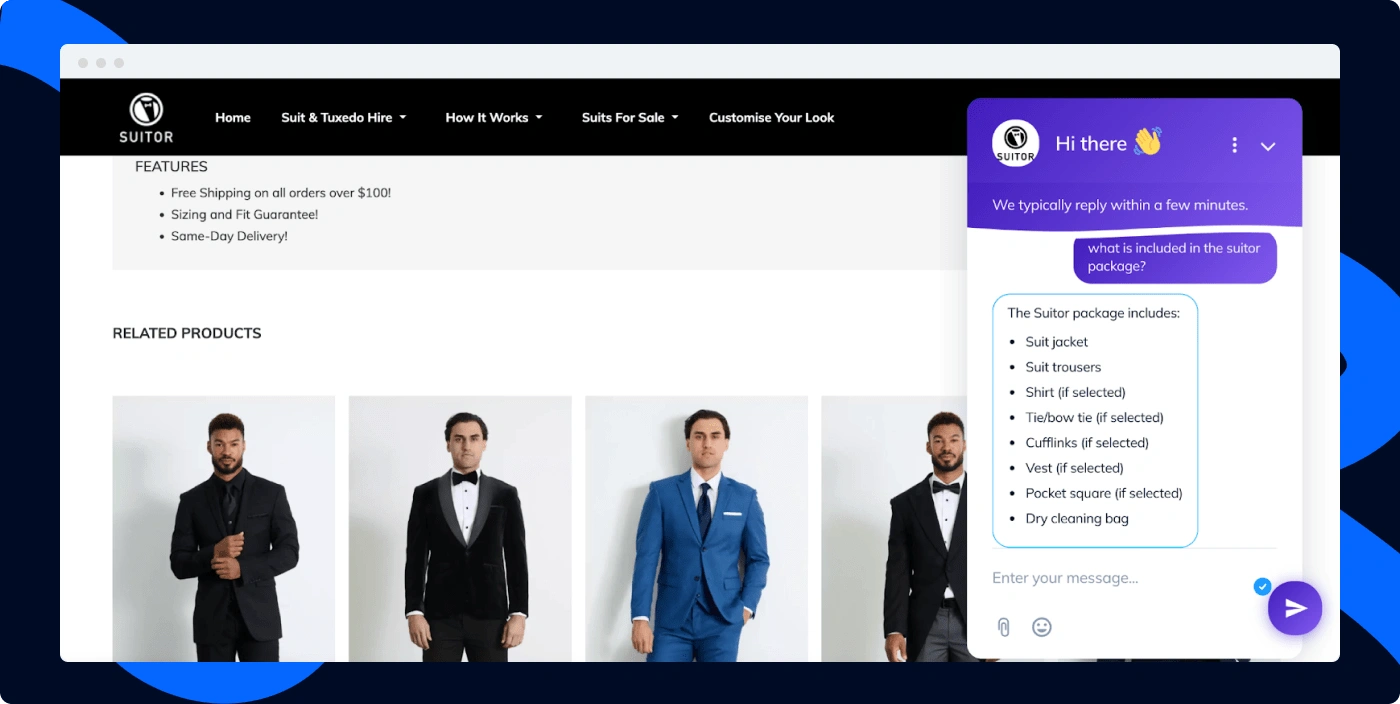
This automation not only improved response times—dropping from three minutes to just six seconds—but also enhanced customer satisfaction, allowing Suitor to scale efficiently.
4. Prioritize requests
When you’re running a customer support team, there are days when hundreds of requests flood in. Some are urgent—like a customer whose payment failed right before checkout—while others are simple, like a password reset.
Instead of drowning in chaos, AI steps in. It reads each request, figures out who needs help the fastest, and directs them to the right agent or even an automated chatbot. On top of speed, AI understands tone and urgency, so an angry tweet about a faulty product might get pushed to the front of the line, while a general inquiry about store hours gets a lower priority.
But AI doesn’t stop there. It learns your VIP customers and makes sure they get a fast response. It also keeps track of past conversations, so if someone has asked about the same problem three times, their ticket gets escalated automatically.
Here’s an example of a company using AI to efficiently prioritize requests:
Tidio helped Integratec prioritize tickets and streamline customer service using AI-driven automation. By implementing our Lyro AI agent and a ticketing system, Integratec was able to track customer inquiries and automatically filter requests.
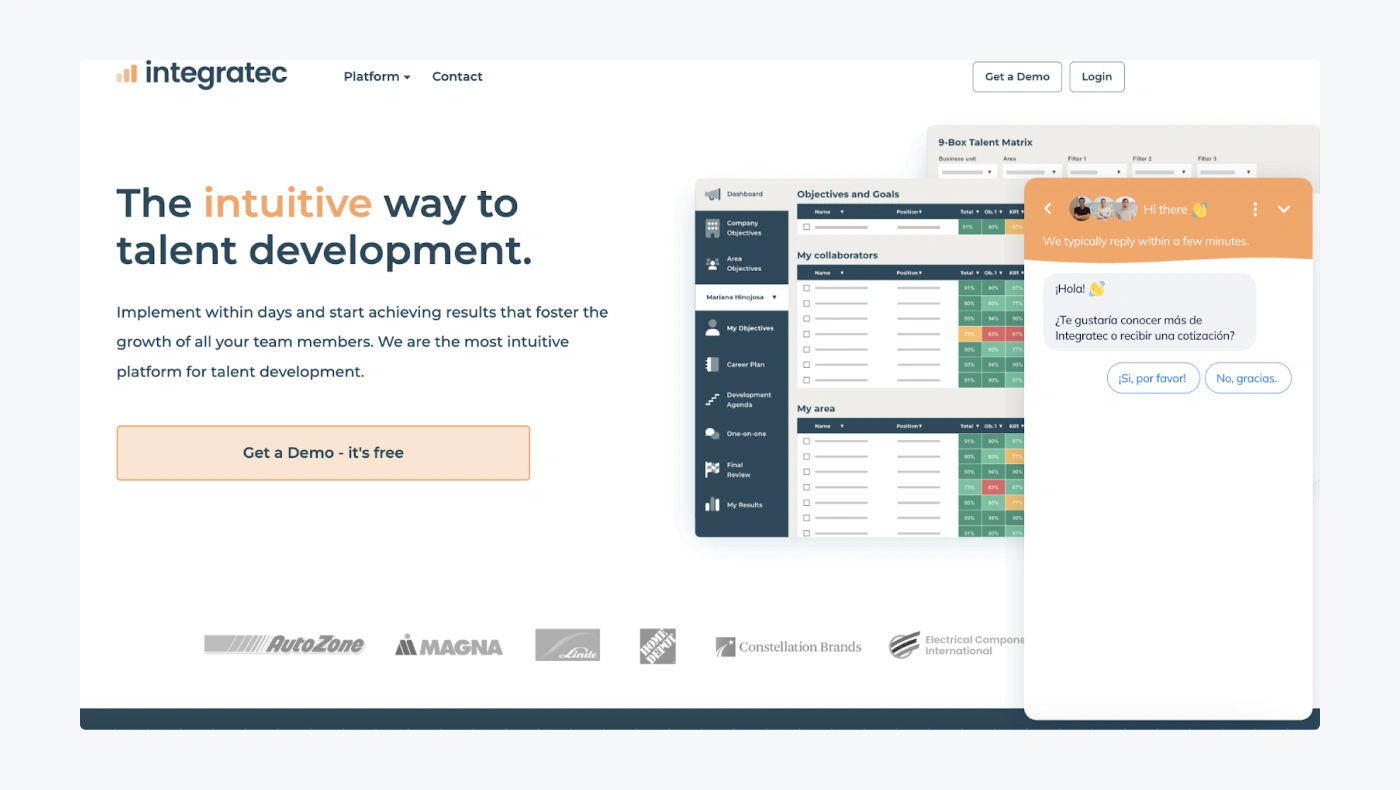
Lyro engaged 26% of Integratec website visitors, tagging and segmenting them based on custom properties, which improved their overall customer support efficiency.
5. Enable self-service
For customers who prefer to find answers themselves, AI can help at every stage of their journey.
How exactly?
Well, AI knows your website and the knowledge base like the back of its (nonexistent) hand. So, from browsing to checkout, customer self-service allows your clients to get necessary guidance and help without any human involvement. This streamlines the shopping process and minimizes the chances of customers leaving your website before making a purchase.
One example of a company benefiting from self-service is eye-oo. This multi-brand platform selling eyewear implemented Tidio’s Lyro AI agent to take care of frequently asked questions and order-related inquiries.

This automation also led to a fivefold increase in conversions as well as a 25% boost in sales. But that’s not all. Their AI agent helped secure €177K in revenue, demonstrating how AI-driven customer service can directly impact business growth.
Read more: Learn how Tidio helped eye-oo increase conversations and sales.
6. Social media monitoring and engagement
Millions of comments, reviews, and discussions happen across platforms like Instagram, X, and Facebook every minute. If your business is present on these platforms, or wants to be, AI helps you sift through this massive amount of data.
By analyzing the sentiment, tone, and context of posts and messages, AI can detect acute issues with your business or service and areas for improvement. This allows your business to engage with your audience directly to build trust and show that you’re attentive to their needs.
Social media plays a major role in shaping your brand reputation and learning more about your clientele. In fact, over half of business leaders already use social media data to inform their strategy, proving its impact on decision-making.
By keeping an eye on discussions, you can catch negative sentiment before it escalates and identify potential opportunities for product development. With AI’s ability to process and analyze vast amounts of data, you can turn unstructured social media chatter into actionable insights.
6. Recommend products
Think of an in-store assistant but online. That’s what you can use AI for. An intelligent virtual assistant can suggest items based on your customer’s questions, past behavior, and preferences. For example, if your client asks about lightweight running shoes, the AI can instantly recommend the best options without being pushy.
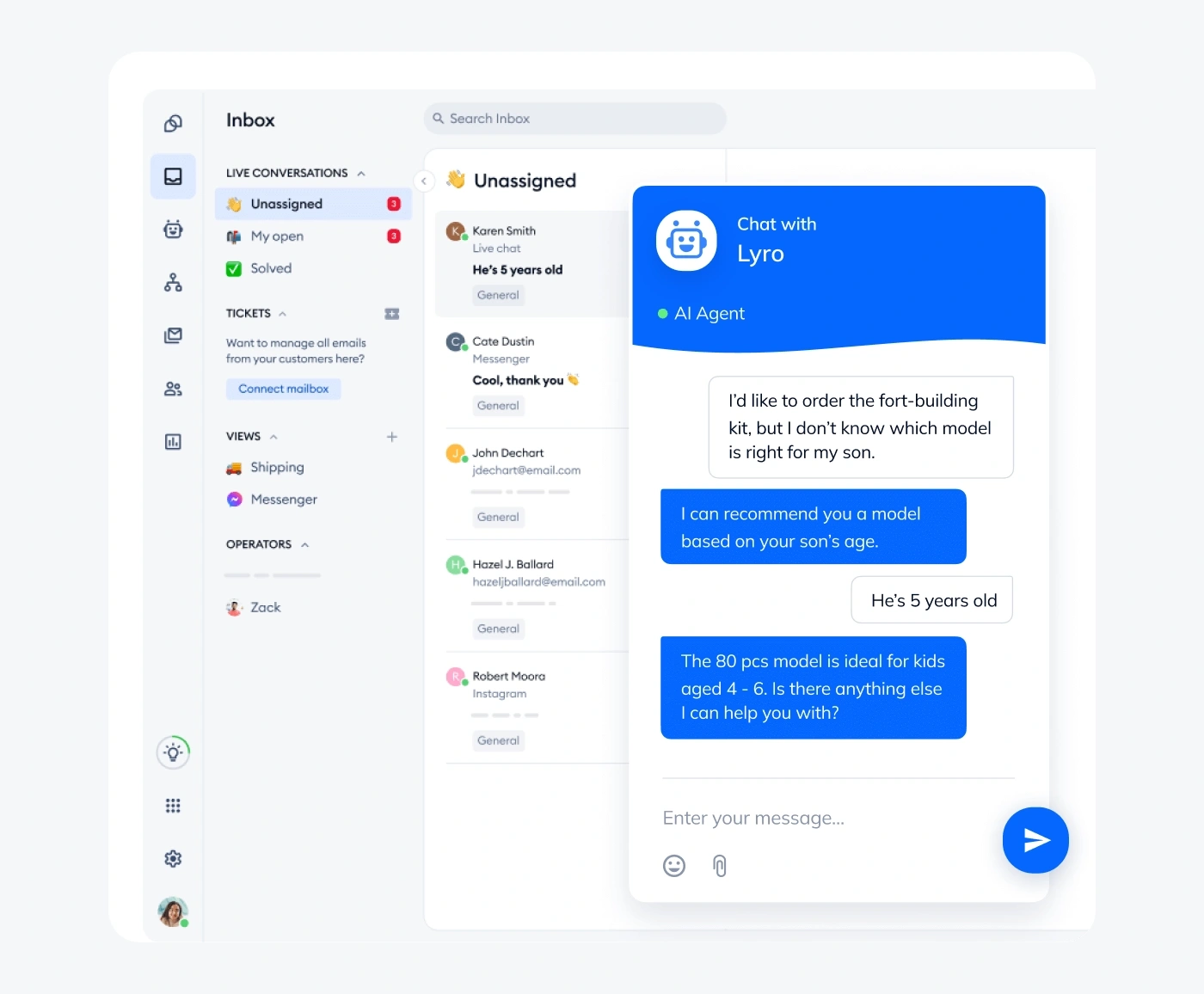
By tracking purchase history, browsing behavior, and common patterns, AI makes real-time recommendations via chat pop-ups, follow-up emails, or in-app suggestions. It can even use visual and voice search to suggest products. like finding similar styles from an uploaded photo or answering voice queries with top-rated options.
Ultimately, AI-powered customer service isn’t just about answering questions. It also personalizes the shopping experience, guides customers effortlessly, and drives more sales.
Benefits of AI in customer service
It’s easy to get lost in all of AI’s capabilities. Whether you’re switching AI solutions or completely redoing your entire customer service strategy, it’s important to identify which AI benefits are right for your business.
Here’s what companies enjoy most about using AI support software:
AI makes customer support workflows more efficient
AI for customer service tools automate repetitive tasks, reduce response times, and keep your agents productive.
Even after launch, an AI agent learns from each visitor’s conversation and improves itself over time. This means it can take over more conversations with even better accuracy, working together with your human support agents.
This approach increases agent productivity on complex cases and decreases wait times without losing the human touch. In fact, over 78% of representatives agree that AI enhances their efficiency at work.
AI customer support is available 24/7 and in multiple languages
Your support team may be efficient and productive, but they can’t be online all the time. That’s where AI agents come in handy. Customer service AI tools are on the clock 24/7, speak multiple languages, and answer requests in seconds.
This is great news if you have global customers reaching out across timezones. No matter when, where, and how urgently they require assistance, users can count on you. In fact, studies show that about 73% of buyers say that AI improves their customer experience.
AI customer support gathers and analyzes data for better user insights
The amount of customer data AI can gather and analyze is truly impressive. Generative AI customer support tools simplify collecting big chunks of information to establish behavioral patterns, get a single client view, and work towards hyper-personalization.
Implementing AI-gathered insights and personalizing customer service experience is crucial. This way, clients only see information that is relevant to them. It’s the easiest way to tailor visitor experiences and keep them hooked.
Read more: Learn the key metrics and chatbot analytics to measure your results more effectively.
AI customer service drastically cuts your support costs
The truth is, hiring more support agents is much more expensive than implementing an AI customer service tool. So, not only do AI solutions bring a lot of money to your company, but they also save on the expenses of hiring and training new employees.
In fact, more than 28% of business leaders already use AI to cut company costs.
You can even get started with AI for free. Many platforms offer freemium versions to play with and come with pre-designed conversation flows and templates.
For big businesses that need more, plans like Tidio+ offer premium features and a guaranteed 50% resolution rate with Lyro AI Agent.
Read more: Check out a full guide on chatbot pricing and analyze different pricing models to pick the right one for your needs.
AI boosts customer satisfaction
Modern-day customers are particular and demanding, with as many as 79% claiming they wouldn’t complete their order if customer service was unresponsive.
However, AI customer service companies help win them over. In fact, as many as 57% of businesses are already using AI to improve their support services. Customer satisfaction is everything when it comes to the ultimate goals—increasing revenue and growing your brand.
How to implement AI in customer service: Lyro AI Agent
AI customer service is destined to become the standard in the business world. It improves your customer support, cuts costs, and makes your support agents more efficient.
As AI customer support advances, make sure you don’t miss out on the opportunity to take your business growth to the next level.
Lyro by Tidio provides you with the newest technology and easy setup. This software helps your business deliver instant, accurate, and personalized support at scale. It engages customers in real time, resolves common inquiries without human intervention, and seamlessly escalates complex issues when needed.
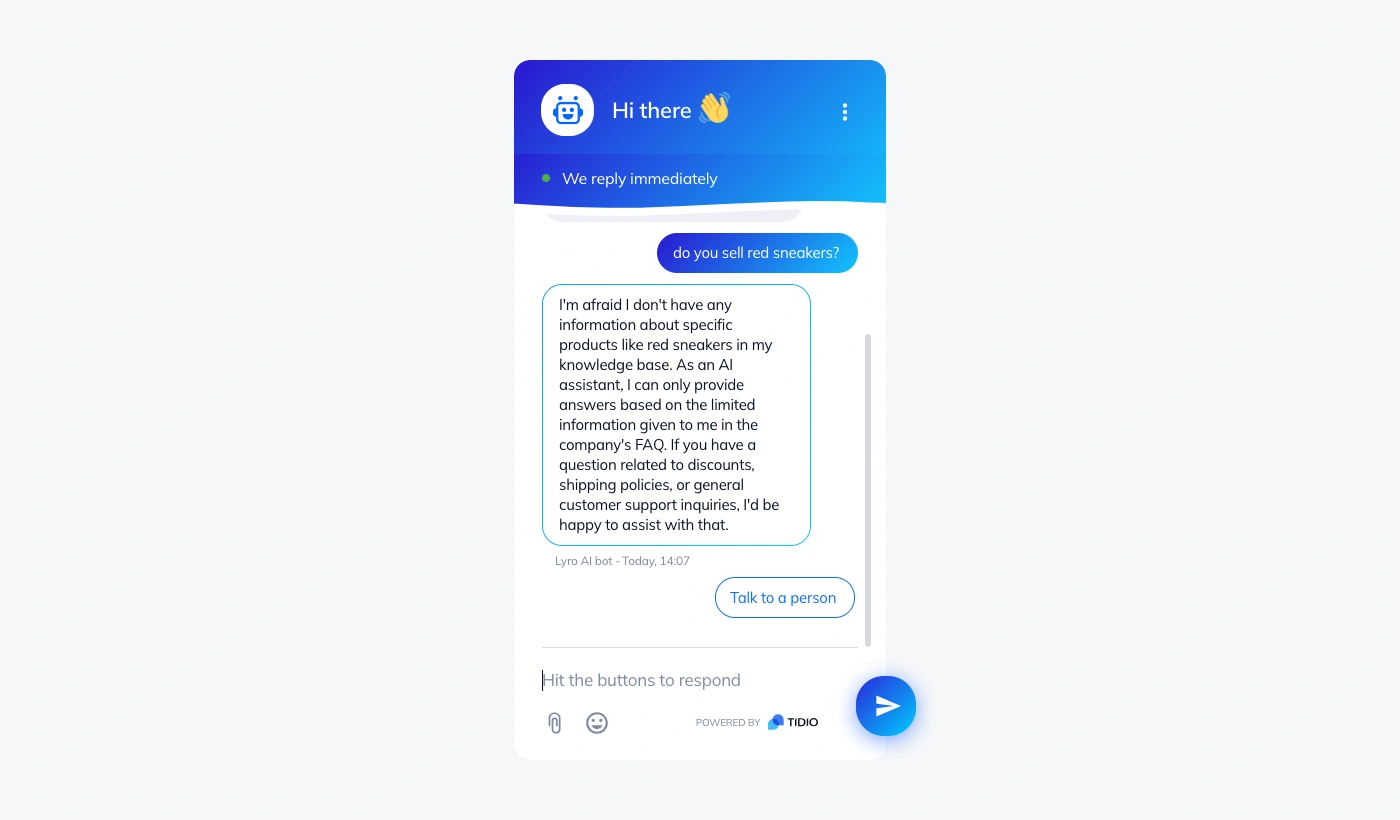
Improve your customer experience with Lyro—effortless AI that understands, responds, and delivers.
Make the most of AI customer service
FAQ
AI customer service refers to the use of artificial intelligence technology to automate and enhance customer support interactions. It uses tools, including AI agents, automation, and machine learning algorithms, to handle a wide range of tasks, from answering frequently asked questions to analyzing customer behavior and providing personalized recommendations.
Three of the best AI for customer service include Tidio’s Lyro AI, Intercom’s Fin AI, and Zendesk AI.
AI is an extension of traditional customer service, it doesn’t replace it. It supports human agents and automates manual tasks.
You can use AI in customer service to greet visitors, answer common questions, perform simple tasks, and provide multilingual support for your international customers.
AI can help customer service decrease first response times, improve multilingual support, increase lead generation, and cut support costs.
Companies such as Wulff Beltton, retailer of products and services for workspaces, use AI for customer service as well as lead generation. Also, Bella Santé spa and eye-oo, eyewear retailer, use AI to boost sales and automate repetitive workflows.
AI in customer service boosts sales by providing instant support and personalizing interactions through data-driven recommendations. On top of that, the technology qualifies leads and proactively reduces cart abandonment.

